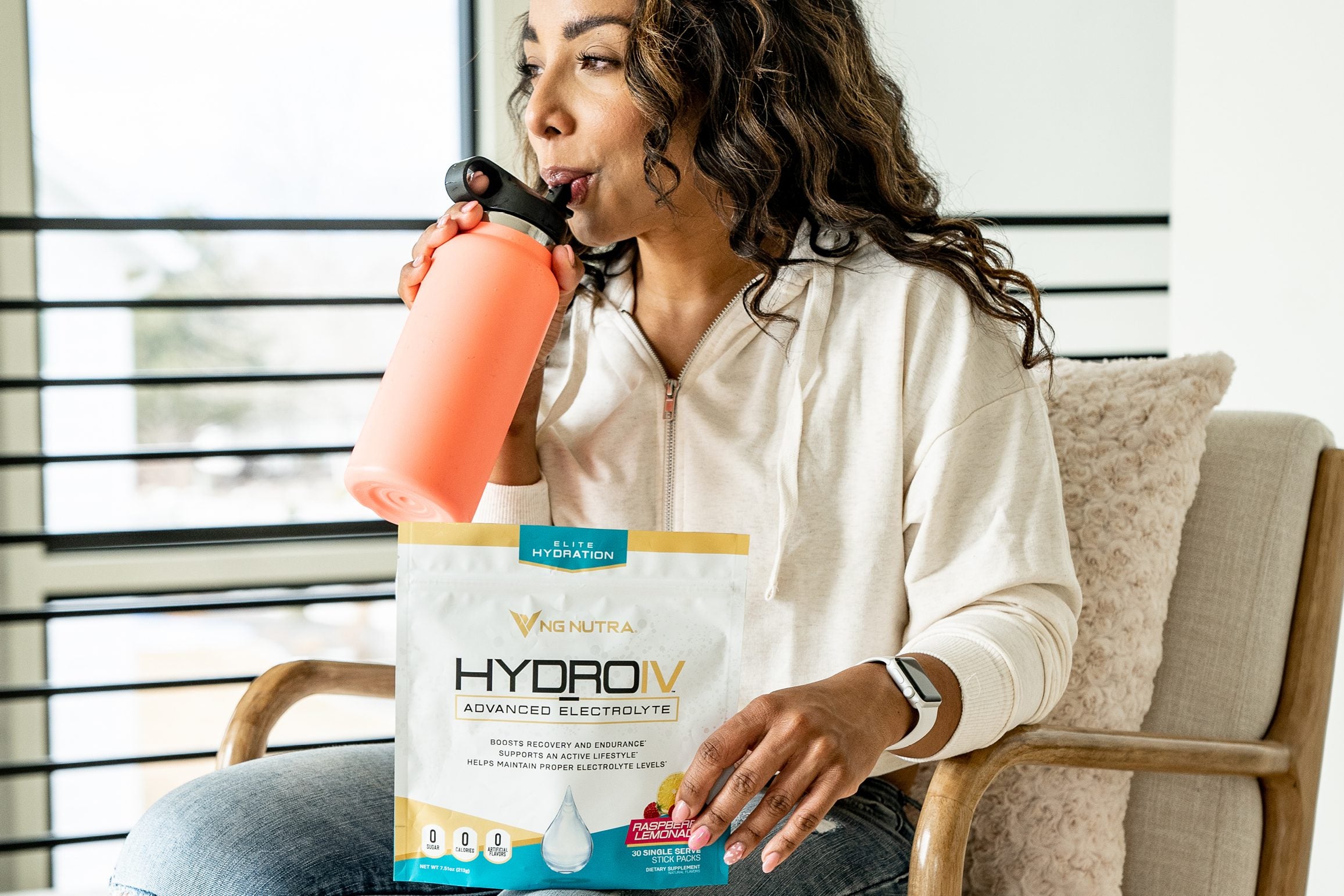It’s easy to get lost down the internet rabbit hole of trying to decide which supplements you need to take before, during, and after your workouts.
/wp:paragraph
wp:paragraph
It’s overwhelming even for the most experienced athlete out there.
/wp:paragraph
wp:paragraph
We want to help simplify the supplement game.
/wp:paragraph
wp:paragraph
What’s the ONE supplement that everyone needs to be taking during their workouts, regardless of their fitness goals?
/wp:paragraph
wp:paragraph
Electrolytes… Hear us out!
/wp:paragraph
wp:paragraph
Electrolytes are essential to workout performance and recovery. Without a proper and balanced electrolyte supplement, you’re more likely to hit your performance wall and miss out on reps, sets, and results.
/wp:paragraph
wp:paragraph
Let’s review the benefits of electrolytes, when you should take electrolytes, and how much you should consume.
/wp:paragraph
wp:heading
What are Electrolytes?
/wp:heading
wp:paragraph
Electrolytes are a type of substance that conduct electricity and act as communication superhighways in your body.
/wp:paragraph
wp:paragraph
They help to control and promote a number of important bodily functions including blood pressure, fluid balance, and muscle contractions.
/wp:paragraph
wp:paragraph
Without electrolytes, you wouldn’t be able to blink, speak, or move. You can’t live without them.
/wp:paragraph
wp:paragraph
Electrolytes can be found in many of the foods we eat, but also in supplement form.
/wp:paragraph
wp:paragraph
The most important electrolytes, especially for performance, are sodium, potassium, and magnesium.
/wp:paragraph
wp:heading
Benefits of Electrolytes
/wp:heading
wp:paragraph
Outside of the essential bodily processes, electrolytes also have other benefits that surround recreation, sports, and performance.
/wp:paragraph
wp:heading {"level":3}
Supports Performance
/wp:heading
wp:paragraph
Did you know that losing as little as one percent of your body weight in water weight can impact strength, speed, and performance?
/wp:paragraph
wp:paragraph
This slight change in water weight loss can mean the difference between winning and losing.
/wp:paragraph
wp:paragraph
Studies show that replacing fluids AND electrolytes can help to stave off a decline in performance. [1]
/wp:paragraph
wp:heading {"level":3}
Decreases Risk of Heat-Related Illnesses
/wp:heading
wp:paragraph
If you exercise outside during the hotter months, you are at a higher risk for dehydration and heat-related illnesses like fatigue and stroke.
/wp:paragraph
wp:paragraph
Electrolyte drinks have been shown to significantly reduce the risk of heat-related illnesses, especially when consumed before and during exercise. [2]
/wp:paragraph
wp:heading
What’s the Best Time to Take Electrolytes?
/wp:heading
wp:paragraph
If you are an active person, an athlete in training, or someone who has a physically demanding job, electrolyte supplements and drinks are a quick and easy way to restore electrolyte loss.
/wp:paragraph
wp:paragraph
Focusing on exercise, there are three important times to take electrolytes.
/wp:paragraph
wp:paragraph
Pre-Workout: Take one serving of an electrolyte supplement like Hydro IV an hour before your workout. This will help to prepare your muscles for the workload that will follow.
/wp:paragraph
wp:paragraph
Intra-Workout: For every 20 minutes of exercise, you should drink 4 to 6 ounces of fluids. Ideally, these will be electrolyte-based fluids. We recommend avoiding the sugary sports drinks because many of them are too high in sugar and too low in electrolytes.
/wp:paragraph
wp:paragraph
Post-Workout: After your workout, drink one to two cups of an electrolyte-based drink or post-workout supplement like Hydro IV.
/wp:paragraph
wp:image {"id":1895079,"sizeSlug":"large","linkDestination":"custom"}
/wp:image
wp:heading
Electrolytes: How Much Should You Take Daily?
/wp:heading
wp:paragraph
Let’s say you have a rest day, but you still want to make sure you’re getting plenty of electrolytes throughout the day. How much should you take of each mineral?
/wp:paragraph
wp:paragraph
Everyone is different, and recommendations can vary based on your age, gender, and fitness level.
/wp:paragraph
wp:paragraph
With that said, there is a general guideline based on MyPyramid.gov:
/wp:paragraph
wp:list
- Sodium: 2,000 mg for the general population / 3,000 mg or more for athletes
- Potassium: 4,500 to 5,000 mg
- Magnesium 350 mg for men / 275 mg for women
- Calcium: 800 mg
/wp:list
wp:heading
Get Your Electrolytes (And A Lot More!)
/wp:heading
wp:paragraph
Electrolytes are a part of any serious lifter or athlete’s supplement program.
/wp:paragraph
wp:paragraph
Not only are they essential for optimal health and fitness, but they also can prevent intra-workout fatigue and crashes.
/wp:paragraph
wp:paragraph
For those athletes who have to train outside, electrolytes aren’t a polite suggestion, they’re a requirement.
/wp:paragraph
wp:paragraph
Hydro IV does more than keep your electrolyte levels elevated, it also provides L-citrulline, which helps to increase nitric oxide production. This means better blood flow, recovery, and energy.
/wp:paragraph
wp:paragraph
Protect your performance with Hydro IV.
/wp:paragraph
wp:heading
References
/wp:heading
wp:list {"ordered":true,"type":"1"}
- Thomas DT, Erdman KA, Burke LM. Position of the Academy of Nutrition and Dietetics, Dietitians of Canada, and the American College of Sports Medicine: Nutrition and Athletic Performance. J Acad Nutr Diet. 2016 Mar;116(3):501-528. doi: 10.1016/j.jand.2015.12.006. Erratum in: J Acad Nutr Diet. 2017 Jan;117(1):146. PMID: 26920240.
- Sun JM, Chia JK, Aziz AR, Tan B. Dehydration rates and rehydration efficacy of water and sports drink during one hour of moderate intensity exercise in well-trained flatwater kayakers. Ann Acad Med Singap. 2008 Apr;37(4):261-5. PMID: 18461208.
/wp:list
wp:paragraph
/wp:paragraph


Share:
The Surprising Benefits of Collagen and Probiotics for Women’s Health
BCAA Before or After Workout? (The Answer Will Surprise You)